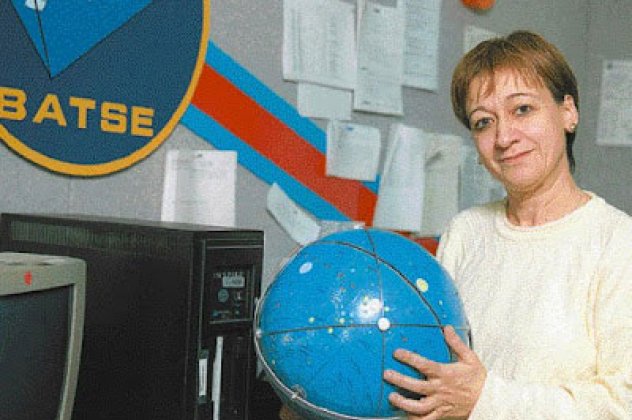Chryssa Kouveliotou
Chryssa Kouveliotou (born in 1953) is recognised worldwide for her work in high-energy astrophysics. She has made fundamental contributions to determining the origins of gamma-ray bursts, the most powerful and brightest explosions in the universe. They are caused by colliding neutron stars or the collapse of massive stars into black holes. She has also been at the forefront of international research into magnetars, neutron stars with the most extreme magnetic fields in nature.
Dr. Chryssa Kouveliotou is a senior technologist in high-energy astrophysics at NASA's Marshall Space Flight Center in Huntsville, Ala.
A longtime, leading researcher in NASA's space science mission, Kouveliotou conducts extensive research on a host of astronomical phenomena, including black holes, neutron stars and gamma-ray bursts.
She has been the principal investigator on numerous research projects in the United States and Europe. Currently, she is a co-investigator on the Gamma-ray Burst Monitor, an instrument flying aboard the Fermi Gamma-ray Space Telescope; a Swift-associated scientist, supporting that multi-wavelength observatory dedicated to the study of gamma-ray burst (GRB) science; and a member of the NuSTAR Science Team, investigating the most powerful explosions in the universe. Over the course of her career, she has worked on a succession of vital NASA research missions, including the International Sun Earth Explorer-3; the Solar Maximum Mission; and the Burst and Transient Source Experiment (BATSE), which flew on NASA's Compton Gamma-Ray Observatory.
She joined NASA in 1991, initially supporting the Gamma Ray Astrophysics Team. Her numerous contributions to the fields of astronomy and astrophysics have expanded scientific understanding of fleeting, transient phenomena in the Milky Way galaxy and throughout the universe. Besides determining the unique properties of the highly energetic emissions from gamma-ray bursts -- the brightest and most powerful cosmic events ever documented -- Kouveliotou was part of the team which in 1997revealed the extragalactic nature of these sources. In 1998, she and her team also made the first confirmed detection of ultra-dense neutron stars called magnetars -- the cinders of stars left over after a supernova.
A native of Athens, Greece, Kouveliotou has received numerous awards for her work. In 2012 alone, she earned the Dannie Heineman Prize for Astrophysics and the NASA Exceptional Service Medal, NASA's highest form of recognition awarded to a Government employee who, by distinguished service, ability, or vision has personally contributed to NASA's advancement of United States' interests; the same year she was named one of Time Magazine's 25 most influential people in space. In 2005, she received the NASA Space Act Award, which recognizes and rewards outstanding scientific or technical contributions significant to NASA's mission. In 2003, she was honored with the Rossi Prize, awarded annually by the High Energy Astrophysics division of the American Astronomical Society. In 2002, she was the sole American representative on the international team which received the Descartes Prize in Astrophysics, which recognizes scientific breakthroughs from European collaborative research in any scientific field.
Kouveliotou has published more than 380 papers in refereed journals and has been among the top 10 most-cited space science researchers in published journals worldwide. She is a member of multiple international advisory committees, boards and review panels. She was elected chair of the Division of Astrophysics of the American Physical Society and currently is a vice president of the American Astronomical Society. She previously served as chair of that organization's High Energy Astrophysics Division. She is a past member of the Committee on Astronomy and Astrophysics of the National Academy of Sciences and currently is the U.S./International Union of Pure and Applied Physics (IUPAP) liaison for the Astrophysics Committee. She is a fellow of the American Physical Society and of the American Association for the Advancement of Science.
Kouveliotou received her bachelor's degree in physics from the National University of Athens, Greece, in 1975, and earned her master's degree in science from the University of Sussex, England, in 1977. She received her doctorate in astrophysics in 1981 from the Technical University of Munich, Germany.
[1], [2]
Source
[1] "NASA" Personal Website
[2] "Columbian College of Arts & Sciences" Department of Physics











